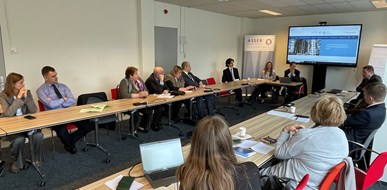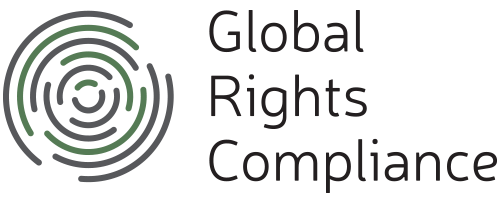[Adjudicating international crimes]: Ukrainian judges visiting the Netherlands
Published 20 April 2023
@Maria Sperling - Ukrainian judges in conversation with the Asser Institute MATRA-Ukraine team.
A group of Ukrainian judges is visiting the Netherlands, as part of an international project that assists the Ukrainian War Crimes Unit in Ukraine to investigate, prosecute and seek remedies for international crimes. The judges, hosted by the Asser Institute and USAID, are in The Hague to visit, amongst others, the International Criminal Court, the Dutch Prosecution Office and Eurojust.
The study visit takes place in the context of the MATRA-Ukraine project ''Strengthening Ukraine’s Capacity to Investigate and Prosecute International Crimes", a joint initiative of the T.M.C. Asser Instituut and Global Rights Compliance. The project aims to assist the Ukrainian War Crimes Unit to investigate, prosecute and seek remedies for international crimes. Alongside supporting the Office of the Prosecutor General, it delivers vital technical and strategic expertise to other criminal justice entities, such as judges and lawyers, civil society organisations and journalists.
It is not the first time that the judges visit The Hague, the city of Peace and Justice. In November 2022, the MATRA-Ukraine project organised a conference, to hear Ukrainian perspectives on the main challenges in dealing with the ever-increasing international crimes Ukraine is confronted with. The conference brought together high-level (inter)national experts, from Ukraine and elsewhere, to exchange knowledge and experiences.
Topics of the exchange included: is the legal framework in place sufficient in terms of international crimes? What assistance do the Ukrainian Office of the Prosecutor General and the Ukrainian investigative agencies need to conduct effective investigations and prosecutions? What is the role of civil society organisations (CSOs) in this context? Why is the critical monitoring of trials by academics, lawyers and journalists important? How should the judiciary in Ukraine be structured and resourced in order to hear international crimes cases? What form (if any) should international assistance to Ukrainian national authorities take?
Senior researcher at the Asser Institute, and co-organiser of the The Hague visit Christophe Paulussen, said: “We hope that our work in the MATRA-Ukraine project will, in a very concrete manner, add to the important effort of making sure that perpetrators of international law will realise that the law is there and in play. We do so by assisting in identifying legal and more practical problems; by linking up experts from different backgrounds to facilitate coordination and cooperation, and by suggesting international law-compliant solutions on the way towards accountability.”
The Ukrainian judges will speak with (intern) national judges, practitioners and policymakers, and will visit, amongst others, the Dutch Bureau of the Council for the Judiciary, the Dutch Supreme Court, the International Criminal Court, Eurojust, the Ukrainian Embassy in The Hague, and the Asser Institute.
Read more
[Podcast]: ‘Ukrainian war crimes trials with Ukrainian judges
Leaving the court every time the alarm goes off and working around power cuts that have halved working days to four hours. These are some of the working conditions of judges in Ukraine. The potential war crimes cases being investigated now amount to 36.000. How are Ukrainian judges managing these pressures? International justice podcast makers Asymmetrical Haircuts talked to Ukrainian judges Hanna Maina and Svitlana Yakovleva about their realities and how the Ukrainian judiciary is adapting. Read more.
Strengthening Ukraine’s capacity to investigate and prosecute international crimes
The MATRA project ''Strengthening Ukraine’s Capacity to Investigate and Prosecute International Crimes" is a joint initiative of the T.M.C. Asser Instituut and Global Rights Compliance. The project is designed to assist the newly created War Crimes Unit in Ukraine to investigate, prosecute and seek remedies for international crimes. Alongside supporting the Office of the Prosecutor General, it will deliver vital technical and strategic expertise to other criminal justice entities, such as judges and lawyers, civil society organisations and journalists. The project is funded by the Netherlands Ministry of Foreign Affairs under the MATRA (MAatschappelijke TRAnsformatie: social transformation) Programme and supported by the Netherlands Ministry of Justice and Security.

